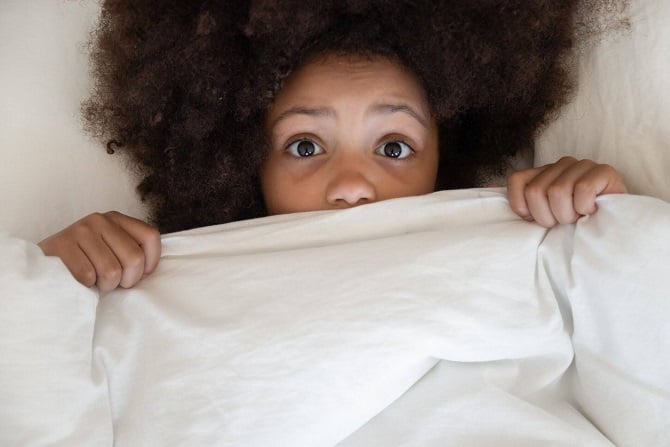
Night terrors in children: What are they and what can you do?
Compared to adults, nightmares and night terrors are more commonplace among children, often causing disturbed sleep for parents as they try to reassure their little one and lull them back to sleep.
However, despite having many similarities, nightmares and night terrors are very different. While almost everyone experiences bad dreams through childhood, night terrors affect just 1–6% of children (WebMD) and the ordeal is much more intense for both parent and child.
Let's take a look at what night terrors are and why they occur, as well as sharing some tips for handling them if your child suffers from them.
What are night terrors?
A night terror is a sleep disorder where the victim develops great feelings of fear, often spilling over into screaming, shouting, and thrashing. In some cases, a child may get out of bed and open their eyes but still remain asleep, much like sleepwalking.

Other effects of a night terror include an increased heart rate, heightened breathing, and sweating. Due to the sheer sense of overwhelming panic, it can often prove difficult to get a child back to sleep after an episode. Most night terrors last for several minutes — sometimes up to 15 minutes — and can occur more than once a night, according to the NHS.
Why do night terrors happen?
A night terror typically occurs because a child has experienced a disturbance when they're sleeping deeply through the night — Kidshealth.org defines this as an "over-arousal of the central nervous system during sleep". Children that come from a family with a genetic history of night terrors and sleepwalking are more likely to suffer an episode.
It's also thought that night terrors can be triggered by factors that affect deep sleep. An increase in the amount of deep sleep — caused by things like tiredness, fever, or medication — can be one trigger. Another can be instances where this stage of sleep is disrupted, commonly because of anxiety, excitement, sudden noise, or needing the toilet.
What can I do if my child experiences night terrors?

As you always want to see your little one sleeping soundly, it can be an alarming experience if your child suffers from a night terror. However, when it comes to dealing with one that's in full swing, the best course of action is to wait patiently for it to pass, taking care that your son or daughter doesn't cause harm to themselves.
It's best to avoid waking your child during their episode, though you may be tempted. Most children will return to regular sleep after a few minutes and being forced to wake up can leave them confused and less likely to nod off again. Plus, it's unlikely that they will remember the experience, so waking them up will only unsettle them.
Once the episode is over and they've settled down, it's safe to wake your child up. Check they're fully awake and get them to use the toilet, if necessary, as this will help to reset their sleep and avoid them falling straight back into a night terror.
Unfortunately, there is no guaranteed treatment for night terrors, but there are a few things that you can do to ease your child into sleep and deal with the root causes:
Help them to deal with stress
Like adults, it's possible for a child to get stressed and go to bed fretful, which can contribute to night terrors. Try to find out what's causing the problem and help them deal with it — the Huffington Post have a few helpful tips for reducing stress in children that you could try.
Establish a relaxing bedtime routine
We've written about relaxing bedtime routines for adults, but much of the same advice applies to kids, too. Ensuring they eat and drink right, limiting screen exposure before bed, getting them to take a hot bath, and reading a story together, are all effective steps when helping them relax before sleep.
Prevent them from becoming overtired
Being overtired is often a precursor of night terrors, so it’s a good idea to keep an eye on your child's schedule to make sure they're not tiring themselves out too much, as well as getting enough rest.
Give imaginative kids a creative outlet
Night terrors tend to affect children that have active, vivid imaginations, so be sure to give them a creative outlet during the day and encourage them to express themselves. This could be through drawing, drama, singing, dancing, or something else.Talk to them in the right way about night terrors
: The last thing you want your child to do is to build up a real fear of their night terrors, so you should take care to discuss their episodes in a manner that doesn't increase anxiety or make them worried.Even though the majority of night terrors can be dealt with at home, you should speak to a doctor if they occur multiple times a night or they happen regularly. A medical professional should be able to identify any underlying conditions causing the problems.
We hope this article has clarified what a night terror is and why they happen, as well as providing valuable advice on how to deal with your child's episodes. Be sure to read our blog or visit our advice centre for more sleep guidance. Don't hesitate to contact us if you have any questions.









Leave a Reply